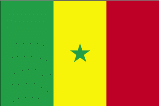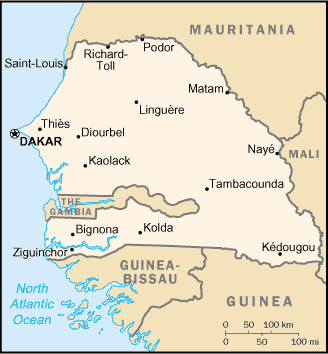|
Senegal
|

|
Capital: Dakar
Population: 16,296,364
Brief History of Senegal:
Senegal has been inhabited for thousands of years. The Arabs arrived in the 11th century and many of the local tribal peoples converted to Islam. Later, in the 13th and 14 centuries the Mandingo and the Jolof Empires formed in Senegal.
When Europeans first arrived Senegal became a major area for slaves. It wasn't until the 1850s when the French began to explore further inland and colonize the land. In 1959 Senegal and the French Soudan merged and formed the country the Mali Federation. This didn't last very long as in 1960, Senegal declared its own independence and Leopold Sedar Senghor became the first president of Senegal.
The Geography of Senegal
Total Size: 196,190 square km
Size Comparison: slightly smaller than South Dakota
Geographical Coordinates: 14 00 N, 14 00 W
World Region or Continent: Africa
General Terrain: generally low, rolling, plains rising to foothills in southeast
Geographical Low Point: Atlantic Ocean 0 m
Geographical High Point: unnamed feature near Nepen Diakha 581 m
Climate: tropical; hot, humid; rainy season (May to November) has strong southeast winds; dry season (December to April) dominated by hot, dry, harmattan wind
Major cities: DAKAR (capital) 2.777 million (2009), Touba, Thies
The People of Senegal
Type of Government: republic
Languages Spoken: French (official), Wolof, Pulaar, Jola, Mandinka
Independence: 4 April 1960 (from France); note - complete independence was achieved upon dissolution of federation with Mali on 20 August 1960
National Holiday: Independence Day, 4 April (1960)
Nationality: Senegalese (singular and plural)
Religions: Muslim 94%, Christian 5% (mostly Roman Catholic), indigenous beliefs 1%
National Symbol: lion
National Anthem or Song: Pincez Tous vos Koras, Frappez les Balafons (Pluck Your Koras, Strike the Balafons)
Economy of Senegal
Major Industries: agricultural and fish processing, phosphate mining, fertilizer production, petroleum refining, construction materials, ship construction and repair
Agricultural Products: peanuts, millet, corn, sorghum, rice, cotton, tomatoes, green vegetables; cattle, poultry, pigs; fish
Natural Resources: fish, phosphates, iron ore
Major Exports: fish, groundnuts (peanuts), petroleum products, phosphates, cotton
Major Imports: food and beverages, capital goods, fuels
Currency: Communaute Financiere Africaine franc (XOF); note - responsible authority is the Central Bank of the
National GDP: $25,150,000,000
** Source for population (2012 est.) and GDP (2011 est.) is CIA World Factbook.
Back to Geography Home Page
